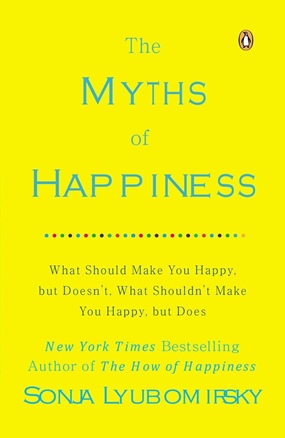Description
The bestselling author of The How of Happiness reveals how to find opportunity in life’s thorniest moments
Focusing on life’s biggest, messiest moments, Sonja Lyubomirsky provides readers with the clear-eyed vision they need to build the healthiest, most satisfying life. Lyubomirsky argues that we have been given false promises—myths that assure us that lifelong happiness will be attained once we hit the culturally confirmed markers of adult success. This black-and-white vision of happiness works to discourage us from recognizing the upside of any negative and limits our potential for personal growth. A corrective course on happiness and a call to regard life’s twists and turns with a more open mind, The Myths of Happiness shares practical lessons that prove we are more adaptable than we think we are. It empowers readers to look beyond their first response, sharing scientific evidence that often it is our mindset—not our circumstances—that matters most.
About the Author
The majority of my research career has been devoted to studying human happiness. Why is the scientific study of happiness important? In short, because most people believe that happiness is meaningful, desirable, and an important, worthy goal, because happiness is one of the most salient and significant dimensions of human experience and emotional life, because happiness yields numerous rewards for the individual, and because it makes for a better, healthier, stronger society. Along these lines, my current research addresses three critical questions: 1) What makes people happy?; 2) Is happiness a good thing?; and 3) How and why can people learn to lead happier and more flourishing lives?Why Are Some People Happier Than Others?I have always been struck by the capacity of some individuals to be remarkably happy, even in the face of stress, trauma, or adversity. Thus, my earlier research efforts had been focused on trying to understand why some people are happier than others (for a review and theoretical framework, see Lyubomirsky, 2001). To this end, my approach had been to explore the cognitive and motivational processes that distinguish individuals who show exceptionally high and low levels of happiness. These processes include social comparison (how people compare themselves to peers), dissonance reduction (how people justify both trivial and important choices in their lives), self-evaluation (how people judge themselves), and person perception (how people think about others). All of these processes, it turns out, have hedonic implications – that is, positive or negative consequences for happiness and self-regard – and thus are relevant to elucidating individual differences in enduring well-being. My students and I have found that truly happy individuals construe life events and daily situations in ways that seem to maintain their happiness, while unhappy individuals construe experiences in ways that seem to reinforce unhappiness. In essence, our research shows that happy individuals experience and react to events and circumstances in relatively more positive and more adaptive ways. For a recent example, we found that happy individuals are relatively more likely than their less happy peers to “endow” positive memories (i.e., store them in their emotional “bank ACCOUNTS”) but to “contrast” negative memories (i.e., “life is so much better now”) (Liberman, Boehm, Lyubomirsky, & Ross, 2011).On-going studies in my laboratory are exploring additional cognitive and motivational processes that support the differing worlds of enduring happiness versus chronic unhappiness. For example, several investigations have revealed that unhappy individuals are more likely than happy ones to dwell on negative or ambiguous events (Lyubomirsky, Boehm, Kasri, & Zehm, 2011). Such “dwelling” or rumination may drain cognitive resources and thus bring to bear a variety of negative consequences, which could further reinforce unhappiness. These findings demonstrate some of the maladaptive by-products of self-reflection, suggesting that not only is the “unexamined life” worth living, but it is potentially full of happiness and joy.To cast our work on happiness in a broader framework, we have also been exploring the meaning, expression, and pursuit of happiness across cultures, subcultures, and age groups (e.g., Boehm, Lyubomirsky, & Sheldon, 2011). For example, despite media reports, we have found that parents actually experience more happiness and meaning than do non-parents–both when evaluating their lives as a whole, when going about their days, and when caring for their children (versus doing other ACTIVITIES; Nelson, Kushlev, English, Dunn, & Lyubomirsky, 2013). Of course, parents’ happiness is impacted by myriad factors, including their age and SES and their children’s ages and temperaments (Nelson, Kushlev, & Lyubomirsky, in press). Furthermore, we are currently carrying out happiness-increasing interventions among Japanese engineers,
